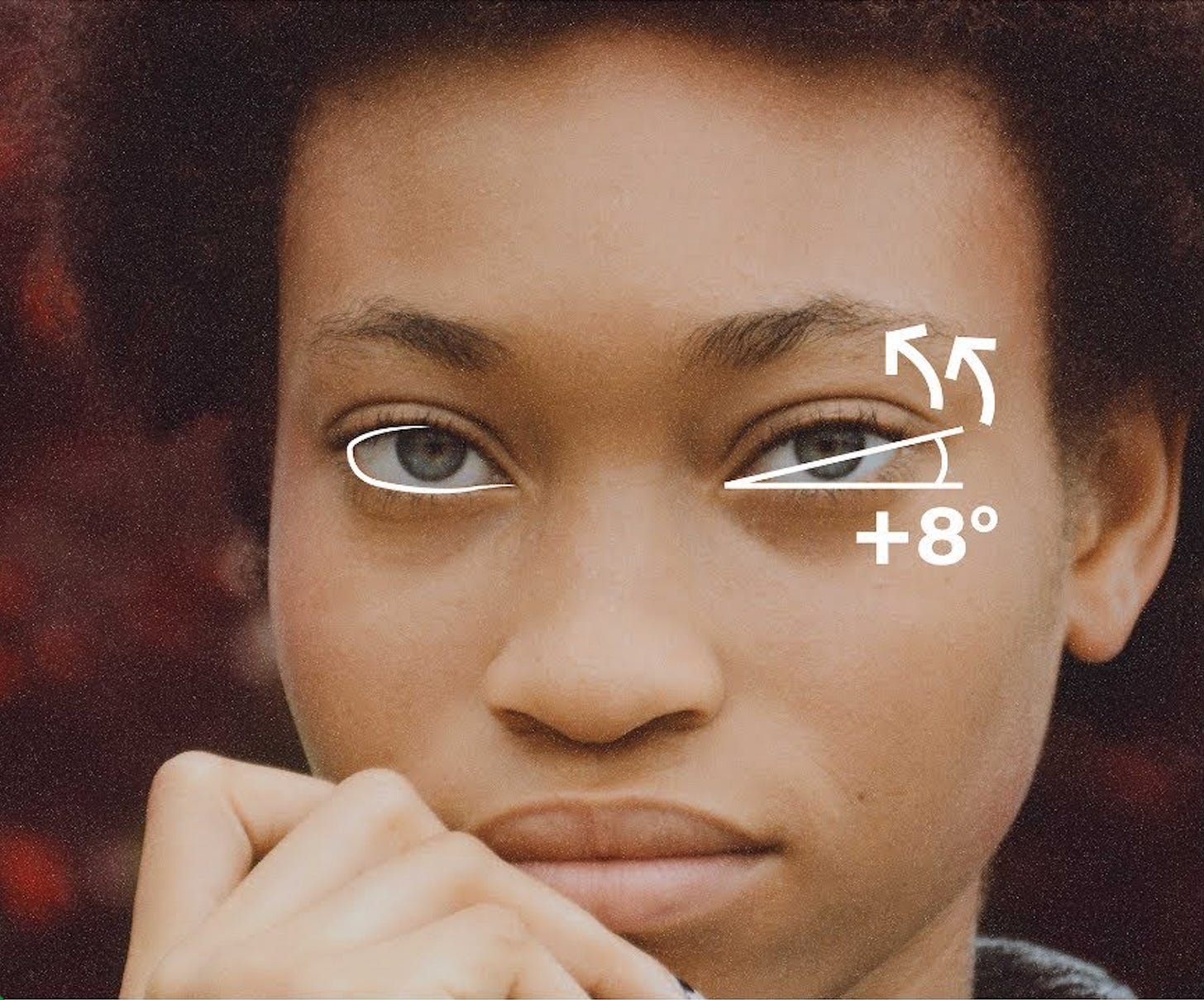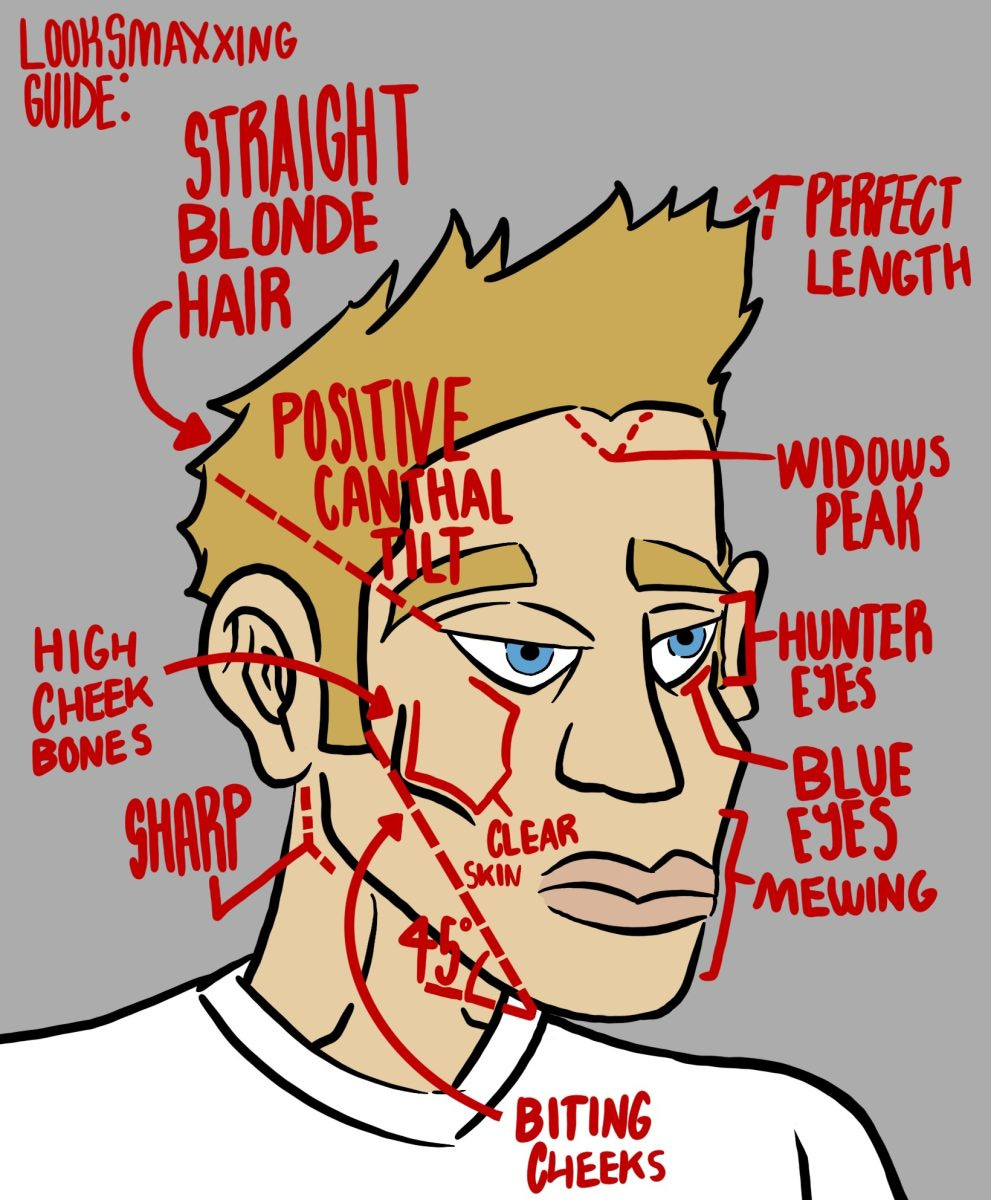The Slow Burn Back to Eugenics
Desirability Maximization as Eugenic Politics
I can’t get away from it, no matter how much I press “not interested”, another video will find its way across my feeds addressing something I didn’t know I was supposed to be insecure about. One week it’s the direction of my canthal tilt,1 another week the vertical fifths ratio, or maybe looksmaxxing, and so on. To many, these trends don’t have any significance beyond their annoying, semiregular resurgence. However, their impact goes beyond triggering the expected eye roll and short-lived hyperfixation. Whenever a new one of these beauty or desirability improvement projects emerges I cannot help but ask myself: isn’t this a form of eugenics?

Don’t roll your eyes just yet, let me make my case before you throw your tomatoes. So, we know that eugenics is an ideology that grounds itself on the idea that we should be selectively breeding people to enhance “desirable” qualities and eliminate “undesirable” ones (Perkowitz).2 The movement drove mass sterilization campaigns across Germany, the U.K., and the U.S. while it grew in popularity as a “societal and human improvement” project (Sanger 210).3 Subsequently, wealthy white men began qualifying what it meant to have genius/good character or a predisposition for criminality, bad social behavior, and “feeblemindedness” (Fendley).4 Anyone who fell on the undesirable end of that spectrum became frequently subjected to all sorts of state-sanctioned violence. This need to control the reproduction of certain populations not only resulted in the emergence of forced sterilization legislation across 32 states in the U.S.—preventing those classified as disabled, criminals, impoverished, and generally “unfit” (ahem, people of color) from producing offspring (Sanger 212)—but it also eventually began influencing U.S. immigration policy by defining who was considered a desirable immigrant (Perkowitz).5
Even the mother of birth control herself, Margaret Sanger, was passionate about the eugenics project. In her eyes, birth control “concerns the whole wide world, the ultimate destiny of the human race” because “human weeds6 clog up the path, drain up the energies and the resources of this little earth” (Sanger 215). This is not a case against birth control—that’s not where I’m going; this quote from Sanger demonstrates just how pervasive the eugenics movement was in the US. Despite its extremely negative impacts, this ideology doesn’t just disappear from our popular rhetoric. Instead, it’s become subtly ingrained in various aspects of our society.
Where am I going with this? How does it relate to the frequently repackaged made-up insecurities sold to us as beauty trends?
To answer this question, we’ll need to recognize the difference between hard and soft eugenics. Hard eugenics is what I just described; characterized by authoritative legislation and actions that impede the autonomy of individuals who aren’t classified as having “desirable genetic qualities”. I put this in quotes because when white wealthy men create a standard for existence you can guarantee that they will identify themselves as the pinnacle and those who deviate furthest from them as “unfit” to procreate. Hiding behind “genetic resilience” fools us—or themselves—into thinking this self-selection is morally just.
In an article titled “How to Understand the Resurgence of Eugenics”, Sidney Perkowitz discusses soft eugenics by relating it to gene editing. It is labeled as “soft” because it doesn’t involve the same kind of authoritarian practices as the original eugenics movement. I want to expand this idea of soft eugenics to include practices that further the ideology by embedding eugenic viewpoints into our cultural zeitgeist. I am doing so because—as we’ve historically observed—movements are furthered through action and the normalizing of their ideologies through media, culture, and quotidian understandings of what we hold to be morally just. This is where pop eugenics comes in. I characterize pop eugenics as a type of soft eugenics that serves to slowly and subtly inscribe eugenics back into our beliefs through popular culture using social and traditional media.

We’ve all seen the occasional social media rant from a weirdo proudly proclaiming that poor people shouldn’t be allowed to have kids.7 But a more subtle form of pop eugenics is desirability-maximizing trends we are all too familiar with. Let’s take looksmaxxing for example: at first glance, it’s just improving your looks by adopting certain rituals and practices. That sounds innocent enough considering how many of us revel in our daily morning routines and bask in the glory of our Sunday resets but looksmaxxing—and these types of trends in general—is a different beast altogether. The trend is predicated on the idea that romantic success can be attributed to the “genetic advantages” of certain groups of people. For those who may want to argue that this is not the case, I’ll remind you that the looksmaxxing trend was birthed by incels and the manosphere community because they “heavily attribute romantic success to the perceived genetic advantages held by tall and muscular men” (Bernstein).8 And yes, things can evolve beyond their point of origin, but that is specifically why the idea of pop eugenics is so potent: it normalizes our exposure to “genetic” maximization and slowly inches us toward embracing increasingly extremist politics. Let’s also not forget that looksmaxxing, at its core, depends on the consensus that traits closer to the European ideal are most desirable. Desirability maximizing that is predicated on the concept of genetic advantage will eventually push us toward, as I mentioned above, something more pervasive and sinister.
Some may argue that these are only online trends and deny their influence on our daily lives, to address this I want to use the example of a TikTok I saw on my FYP a while back. In the post, a user confesses to complimenting someone’s positive canthal tilt. They then witnessed the complimented person pull out a laptop and drop the class, presumably, in response to their comment. This is a perfect example of the normalization of such thought patterns in our daily interactions and how we create positive/negative associations with those perceived to be either on the “beneficial” or “detrimental” side of such trends. Additionally, it demonstrates how we are—rightfully so—currently repulsed by such behavior. Depending on the class, I would’ve dropped it too or, at the very least, never sat next to that person again. Even if this was done in jest, I don’t doubt—based on how often pickup artists are caught using manosphere teachings in real life—that many people use these exact metrics to define beauty. I fear that the more we interact with such trends the closer we are to evolving from having a natural repulsion to these hyper-specific—therefore inherently exclusionary and hierarchical—definitions of beauty to happily defining ourselves using such harmful standards.9
Once we contextualize these beauty trends under desirability politics, it becomes easier to understand how desirability politics enforce a hierarchy of beauty. We then must ask ourselves who’s setting these standards and whose “genetic advantages” are deemed beautiful—desirable, valuable, and worthy of humanity. To put it frankly, popular interpretations of desirability and the trends that push us toward redefining beauty in hierarchical ways cause us to celebrate certain “genetic advantages” that don’t typically, if ever, benefit disabled folks, fat folks, folks who don’t have enough disposable income to invest in their outward appearance, anyone who lives at the intersections of these lived experiences and/or is constantly pushed toward the margins of beauty. And if we squint, aren’t these the same exclusions that eugenics enforces? Narrowing the definitions of beauty is one of the many ways that pop eugenics keeps us subscribed to its ideals and inches us toward accepting more extremist interpretations of eugenic politics.
If you’ve made it this far, thank you. I appreciate your reading. I’m still building, so there will be lots of experimenting for the foreseeable future and I can’t promise that all my letters will feel or sound like this. But, If you are down for some chaos, I invite you to stay. — ana
Sinay, D. (2023, September 28). What is a canthal tilt, and does it really determine how attractive you are?. Glamour. https://www.glamour.com/story/canthal-tilt-tiktok-trend
Perkowitz, S. (2017, April 5). How to understand the resurgence of eugenics. JSTOR DAILY. https://daily.jstor.org/how-to-understand-the-resurgence-of-eugenics/
Alexander Sanger. (2007). Eugenics, Race, and Margaret Sanger Revisited: Reproductive Freedom for All? Hypatia, 22(2), 210–217. http://www.jstor.org/stable/4640075
Fendley, C. (2020, February 17). Eugenics is trending. that’s a problem. - The Washington Post. The Washington Post. https://www.washingtonpost.com/outlook/2020/02/17/eugenics-is-trending-thats-problem/
DenHoed, A. (2016, April 27). The forgotten lessons of the american eugenics movement. The New Yorker. https://www.newyorker.com/books/page-turner/the-forgotten-lessons-of-the-american-eugenics-movement
HUMAN WEEDS?!?! Girl….don’t piss me off 💀💀💀
Which I think is so fucking funny because capitalism relies on the expansion of an exploited class. It specifically limits resources lower-income folks can have (including family planning) so society can maintain an abundance of personnel they are more than happy classifying as “low-skilled” to justify their exploitation. Instead of being mad at the system actively limiting the resources folks can access to provide for their children, these people love to shit on the victims of such a system. Fuck off.
Bernstein, J. (2023, November 6). Young men seek answers to an age-old question: How to be hot. The New York Times. https://www.nytimes.com/2023/11/06/style/looksmaxxing-tik-tok-dillon-latham.html
Ayandastood’s Soul Salon podcast has a great series on the Ugliness of Beauty:
First in the series: the ugliness of beauty — part 1
Last in the series: beautiful lies ft. Kalpana Mohanty (great reading list in the description)


![[ana]'s avatar](https://substackcdn.com/image/fetch/$s_!ctCW!,w_36,h_36,c_fill,f_auto,q_auto:good,fl_progressive:steep/https%3A%2F%2Fsubstack-post-media.s3.amazonaws.com%2Fpublic%2Fimages%2F7e5d6d12-3cbb-41e2-a0b3-2c26a266e23a_736x736.jpeg)

tbh, fascistic ideologies have creeped in the mainstream and I don't know if it's because we are so used to trends happening every 2 days that people don't pay much attention to the origins of the trend or what it truly means but it's is maddening to see incel/fascist theories being spread like there's nothing and therefore promoting dangerous and racist/ableist rhetoric to young and impressionable people
ur right abt the seeping into normal life bit, people can’t just be attracted to people with their heart they have to intellectualise it and bring in what they think society finds attractive- this also happens with their own self. i think i look good but i have xyz features and my face is asymmetrical and this and that, and now im not feeling so confident abt myself. i’ve noticed that i’ve had those thoughts a lot less now that i’ve stop consuming that content, and i’ve also stopped doing it with other people as well- seeing their face and immediately putting them in these different categories or whatever. but i think a lot of people still think like that with no effort to get out.
when u look at it for what it is, it has a striking resemblance to eugenics but bc people still believe that they’ll get benefits from subscribing to these beliefs and rituals they’ll find every way to justify it- a common sentiment is that “if this is the way the world already works why dont i play into it and get the rewards”. i kind of used to think like that too but then i matured and realised that you’re never going to be happy if you’re always under this hierarchical tension, even if you’re at the top (which you’ll never reach) you still wont be secure bc the fact that theres a hierarchy means that you’re still under threat. it’s an individualistic way of thinking, not everyone can looksmax and-as you said- there will always be people who’ll be considered “bottom of rung” no matter what they do.
it’s also sad that many people feel the need to erase their ethnic features just bc of some ideal that was pitted against them from the beginning